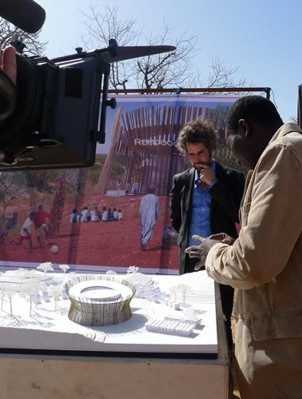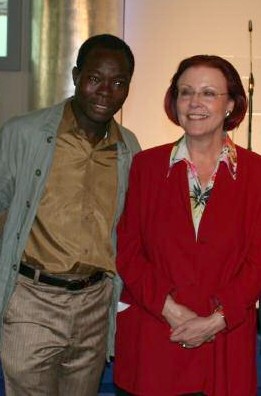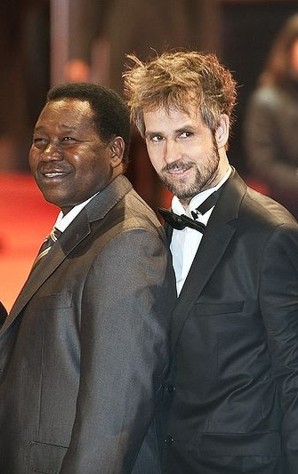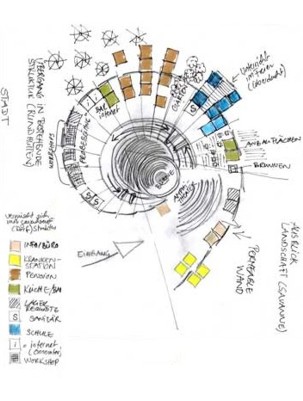|
Burkina Faso Culture - Arts | Society Burkina Faso's "crazy opera" is rising
It is not the first time Mr Kèrè - born in Gando in Burkina Faso and studying architecture in Berlin - has followed and realised a crazy dream. In 1998, he founded an organisation seeking private German funds for the building of schools in Burkina Faso using local materials. A dozen of schools have already been inaugurated.
But the two men soon found out that combining their two visions, an African Bayreuth could be viable and that Burkina Faso was indeed the right place. After all, Burkina Faso is already "the centre of African film and African theatre," as Mr Kèrè now points out. The Burkinabe architect had a tough fight with Mr Schlingensief to get the African reality into the project, a recent interview with the German magazine 'Der Spiegel' reveals. A compromise was the result, where Mr Kèrè could use his experience in local involvement, using local materials and giving something back to the community. Building schools and providing culture education became key parts of the project. Mr Schlingensief however had the last word in choosing the location. In flat Ouagadougou, where the Ministry of Culture already had provided several possible locations for free, the German found no inspiration. In the village of Laongo 40 kilometres north-east of the capital, however, Mr Schlingensief found the magic hill he was looking for, surrounded by stone sculptures on a vast savannah plain. Just like in Bayreuth, the hill provided a natural stage for the opera. Mr Kèrè sat down to draw the massi
His German colleague, reputed as a visionary motivator, managed to gather support for the project in Germany and Burkina Faso. The Burkinabe Ministry of Culture enthusiastically embraced the project, seeing it as "a great possibility" for the country to develop its image as a cultural tourism destination. Every possible support was given. Equally important, Mr Schlingensief founded an organisation, "Festspielhaus Afrika", successfully raising funds for the project. Germany's President at the time Horst Köhler, gave his support and signed an agreement with Burkinabe authorities to co-finance the opera. Money started flowing from the German Development Cooperation Ministry and the Goethe Institut. Media coverage in Germany produced more private donations. In February this year, the construction works in Laongo started. Soon, the first modules started to pop up in a snail shell pattern, allowing for continuous expansion of the opera village. As all seemed to go well, Mr Schlingensief d
His assistant, Christoph Knoch, now is heading the project, promising that everything will go according to plans despite the death of Mr Schlingensief. All partners had promised to stay onboard the giant project. Mr Kèrè still directs the works but admits that he now is more unsure about the future of the project. The risks are of course great. The Laongo opera village, as any other large-scale cultural site, will need long-term support and donations to be viable. It needs enthusiastic leaders to secure not only donations, but also international artists and art quality. It needs knowledge and maintenance to accommodate international tourists. The loss of Mr Schlingensief could therefore prove vital. But maybe Mr Kèrè is about to grow with the responsibility and new fame. For his Gando School, he was the first sub-Saharan African to win the prestigious Aga Khan Award for Architecture. This year, his Burkinabe schools gave him the highly dotted Swiss Architectural Award. Mr Kèrè, based in his Berlin studios, is frequently in the German media. Meanwhile, the "Festspielhaus Afrika" organisation reports that funds keep streaming in, while construction works go on unabated in Burkina Faso. Only time will show what is the future of Africa's first opera village. By staff writers © afrol News - Create an e-mail alert for Burkina Faso news - Create an e-mail alert for Culture - Arts news - Create an e-mail alert for Society news
On the Afrol News front page now
|
front page
| news
| countries
| archive
| currencies
| news alerts login
| about afrol News
| contact
| advertise
| español
©
afrol News.
Reproducing or buying afrol News' articles.
You can contact us at mail@afrol.com











